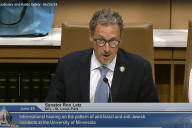You have /5 articles left.
Sign up for a free account or log in.
There was a small incident ten minutes into today’s AWP panel “Shameless Promotion: Get the Book to the Readers.” It was advertised as a session where “two poets, a novelist, and a nonfiction writer with books out in 2008 [would] describe strategies they’ve used to garner readers: book tours, book clubs, personal publicists, and the Web….”
But two panelists, true to their title, had read or recited their own work, and a third was about to begin, when a woman in the back of the standing-room only crowd shouted, “Some of us were wondering, is this the session on self-marketing?”
The panel had begun with a professional tone, the moderator announcing every few minutes that we were about to start and to take a seat, and counting down the last ten seconds aloud, a discipline that, I suppose, along with mention of words such as “measurement metrics of marketing success,” led some to believe we’d start right in.
“Yes,” said the moderator, “we promised a lot, and we call this session ‘marketing in the Marquette Room,’” and she assured us that soon as we got a sense of who the panelists were, we’d “get right to promotional matters.”
“The matters” are important, of course, not only for those with books from indie presses but also for those with the big houses, who even before these our hard times couldn’t push every book, as the nonfiction writer pointed out. The Random House marketing person, when asked about promotional plans for his new book, said, “We publish a lot of books.”
After all four panelists read their short pieces, the session proper got underway, and we were offered solid tips for “establishing and strengthening ‘the brand’”—our books, past, present and future. These included: “getting brave” about asking for blurbs from “writers you revere” (way ahead of you); investing in a reputable, experienced designer for a website, not an amateur (ditto); asking which promotional activities feel like a natural extension of your literary activities; making yourself available to reading clubs; having friends and family help promote you; making sure local and specialized media (hometown papers, alumni associations, etc.) know of your book; and becoming an expert in your topic, so even if your book is, say, a novel, you can write articles on the topic or accept speaking engagements.
There was a lot, much of it useful, and the moderator said we could stop taking notes and go to the website that they—“Squad 365”—had put together. The crowd turned entirely to the panel’s side, muttering words of affirmation when a panelist suggested that “high intelligence and talent” in writers undermined their success by making us believe if an effort is organized, it can’t be talent. The biggest laugh of the session came when the moderator asked to see hands of those “who have an adequate publicity budget.”
Afterward, the floor was opened for questions, and the panelists even shared their mike with a couple of self-identified marketing experts. (“Never put the title of your book or your name in the title of your press release. No one cares,” one said.) By the end of the session, a real buzz was building.





